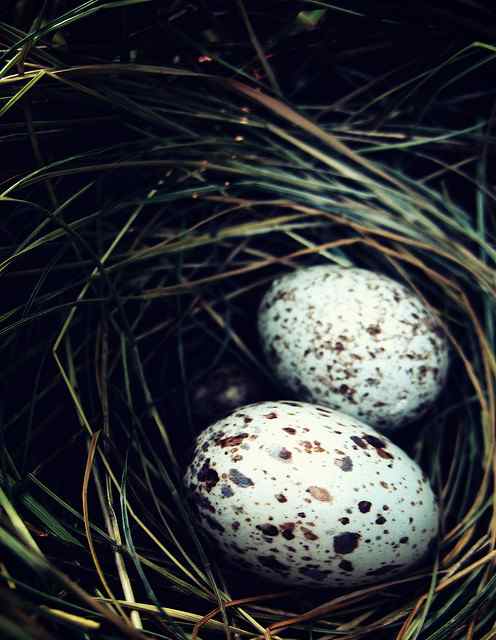For Christmas 2010, my son bought me Michael Quinion’s book Why is Q Always Followed by U?. It’s not the sort of book you’d read in one sitting, but it’s ideal for dipping into on short train or bus journeys or in dentists’ waiting rooms when the other patients have nabbed the only 2 interesting magazines. Michael’s book is full of “facts about the quirky meanings and histories behind the slang and language that we all use”.
One entry starts off with the question “How may you be disgruntled if you are not already gruntled?” and ends up with a discussion of frequentatives. Frequentative is the grammatical term describing the use of a suffix to create a verb for an often-repeated action. The most common one in English is -le.
Gruntle does exist, by the way. Michael Quinlan describes it as “a repeated grunt, especially the conversational noise that pigs make in company”.
The lovely eggs in the photo are a seasonal illustration of frequentatives: from speck to speckle to speckled.
There’s something about –le that makes me smile — it’s a friendly-sounding little device. Words that come to mind are sparkle, crackle, snuggle, dazzle, waddle, crinkle, sprinkle or nuzzle.
Or what about the twinkle in George Clooney’s eyes, or Marilyn Monroe wiggling, jiggling, wobbling and giggling her way through Some Like it Hot? (I don’t know if all of these are frequentatives, but if they’re not they should be).
Photo courtesy of Margolove. The eggs belonged to a cardinal bird and were in a nest right outside her window.
By Marian Dougan

4 responses
Waffle, tittle-tattle – as frequentatives, not a description of this absolutely terrific and hugely revealing posting.
More from this book soon, please, so we can dawdle and meddle and peddle our offerings in the quirky world of the English language.
Hope you are well.
Thanks for the lovely comment, Mike (which I’m so glad you qualified!)
Hi Marian, yes, “-le” is rather lovely, isn’t it, probably nicer than its frequentative cousin “-er” (as in “flutter”, “blabber”, etc.). Horror of horrors, though, my Oxford A-Z of Grammar and Punctuation signally FAILS even to mention this linguistic delight, shame on you, OUP (well, just a bit of shame, anyway).
Tsk, tsk. We’ll need to get on to that. Are they on Twitter, I wonder? (the A-Z people, I mean). That sounds like a pretty addictive book, BTW.